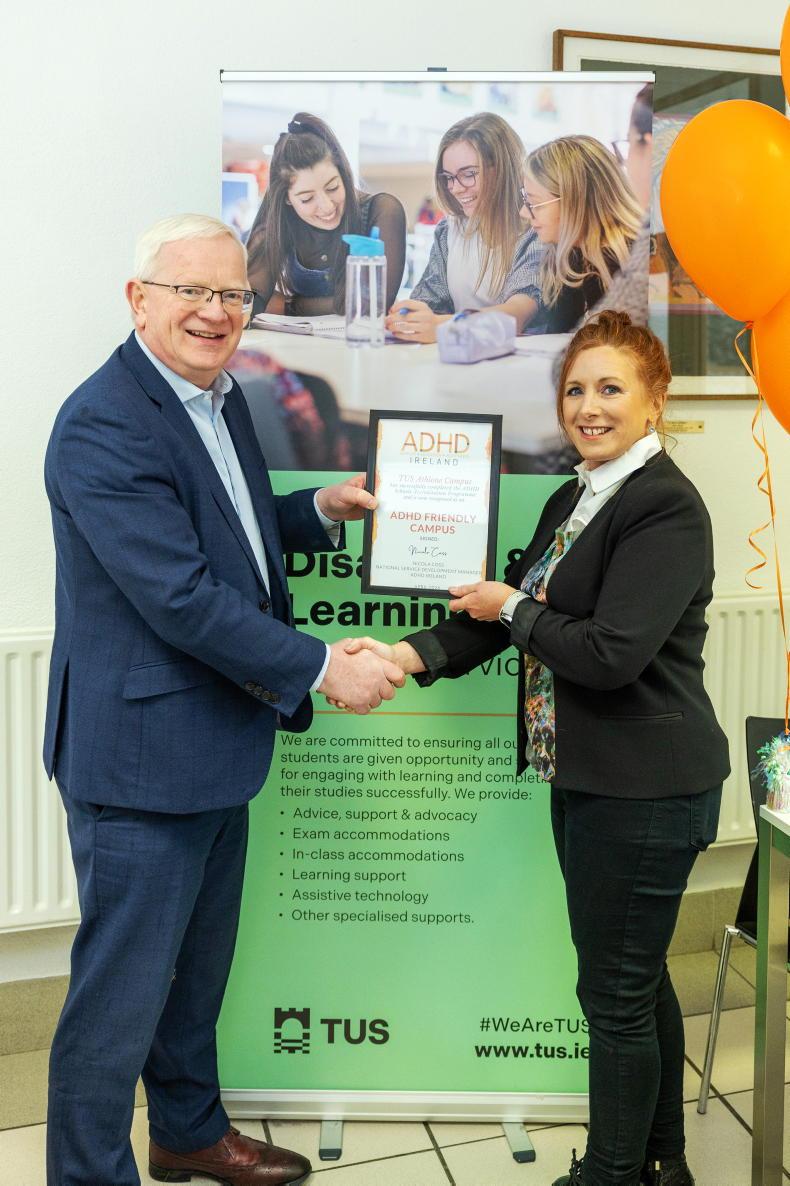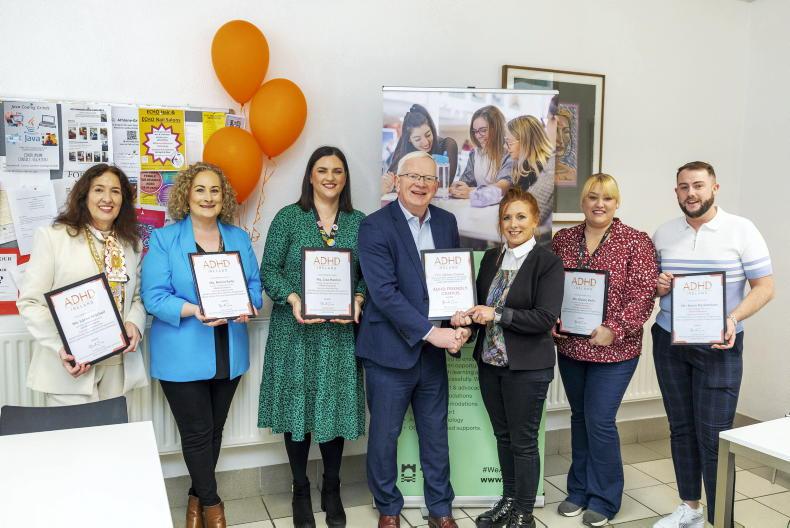Technological University of the Shannon (TUS) has become the first university in Ireland to be officially designated an ADHD-friendly university by ADHD Ireland.
This recognition, on Tuesday 9 April, follows the roll-out of ADHD Ireland’s ADHD-Friendly University Programme across TUS’s campuses, with the aim of promoting awareness, understanding, and practical strategies to support neurodiverse students in tertiary education.
ADHD is a neurological disorder affecting approximately 5% of the population in Ireland, presents challenges related to impulse control, focus, and organisation; statistically, for every class of 30 students, one will have ADHD.
The ADHD Ireland programme addresses the stigma and misconceptions surrounding ADHD and equips teaching staff with the knowledge and tools to recognise and support students with ADHD effectively. It includes comprehensive training sessions for both staff and students.
Creating an environment of acceptance
To celebrate this achievement, TUS held a flag-raising ceremony and certificate presentation for staff who have completed the training.
In attendance was ADHD Ireland, national service development manager, Nicola Coss.
“We are delighted to accredit TUS as Ireland’s first ADHD-friendly university and to work with TUS to create an environment of acceptance and understanding of ADHD,” says Nicola.
They were also impressed with uptake across the teams in the college. With staff having completed various levels of this training they are now empowered with the knowledge and tools needed to effectively support students in their care.
“Within their part of the programme training, TUS students will be equipped with coping strategies to deal with their daily challenges, both academically and socially, overall improving their mental health and positively impacting their life outcomes,” says Nicola.
Getting supports
TUS has seen significant increases in the number of students with ADHD registering with its disability support services over the last four years: a 130% increase in the midlands and a 59% increase in the midwest.
TUS midlands disability officer Lisa Hanlon emphasised the importance of fostering understanding and acceptance of neurodiversity within the university community.

TUS President Prof Vincent Cunnane and Nicola Coss, national service development manager, ADHD Ireland.
“Each year, we see an increase in the number of students with ADHD registering with the Disability Support Service at TUS. The upward trend in applications for support coupled with requests for information on accessing ADHD assessment, suggests an even wider prevalence of ADHD within the student population,” says Lisa.
She continues, “It is imperative that we continue to foster a robust understanding of neurodiversity within TUS where students with ADHD feel understood and accepted. Embracing neurodiversity is not just a goal; it's a philosophy that speaks to our institutional responsibility to fostering a culture of inclusivity and empathy, benefiting the entire university community.”
Read more
Health special: coping with the unexpected side of farming
Providing students with the relevant skills needed in today’s workforce
Technological University of the Shannon (TUS) has become the first university in Ireland to be officially designated an ADHD-friendly university by ADHD Ireland.
This recognition, on Tuesday 9 April, follows the roll-out of ADHD Ireland’s ADHD-Friendly University Programme across TUS’s campuses, with the aim of promoting awareness, understanding, and practical strategies to support neurodiverse students in tertiary education.
ADHD is a neurological disorder affecting approximately 5% of the population in Ireland, presents challenges related to impulse control, focus, and organisation; statistically, for every class of 30 students, one will have ADHD.
The ADHD Ireland programme addresses the stigma and misconceptions surrounding ADHD and equips teaching staff with the knowledge and tools to recognise and support students with ADHD effectively. It includes comprehensive training sessions for both staff and students.
Creating an environment of acceptance
To celebrate this achievement, TUS held a flag-raising ceremony and certificate presentation for staff who have completed the training.
In attendance was ADHD Ireland, national service development manager, Nicola Coss.
“We are delighted to accredit TUS as Ireland’s first ADHD-friendly university and to work with TUS to create an environment of acceptance and understanding of ADHD,” says Nicola.
They were also impressed with uptake across the teams in the college. With staff having completed various levels of this training they are now empowered with the knowledge and tools needed to effectively support students in their care.
“Within their part of the programme training, TUS students will be equipped with coping strategies to deal with their daily challenges, both academically and socially, overall improving their mental health and positively impacting their life outcomes,” says Nicola.
Getting supports
TUS has seen significant increases in the number of students with ADHD registering with its disability support services over the last four years: a 130% increase in the midlands and a 59% increase in the midwest.
TUS midlands disability officer Lisa Hanlon emphasised the importance of fostering understanding and acceptance of neurodiversity within the university community.

TUS President Prof Vincent Cunnane and Nicola Coss, national service development manager, ADHD Ireland.
“Each year, we see an increase in the number of students with ADHD registering with the Disability Support Service at TUS. The upward trend in applications for support coupled with requests for information on accessing ADHD assessment, suggests an even wider prevalence of ADHD within the student population,” says Lisa.
She continues, “It is imperative that we continue to foster a robust understanding of neurodiversity within TUS where students with ADHD feel understood and accepted. Embracing neurodiversity is not just a goal; it's a philosophy that speaks to our institutional responsibility to fostering a culture of inclusivity and empathy, benefiting the entire university community.”
Read more
Health special: coping with the unexpected side of farming
Providing students with the relevant skills needed in today’s workforce







 This is a subscriber-only article
This is a subscriber-only article










SHARING OPTIONS: